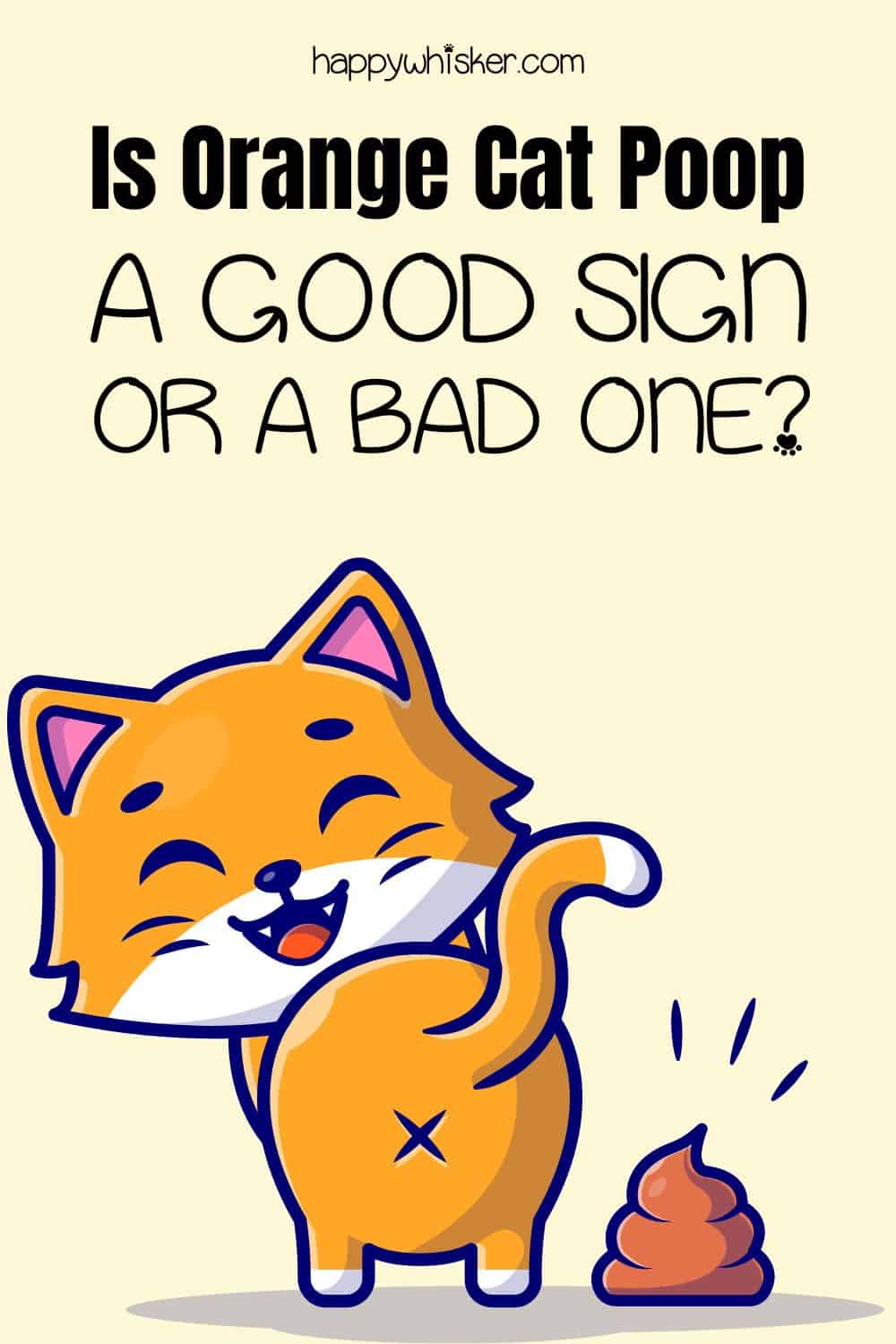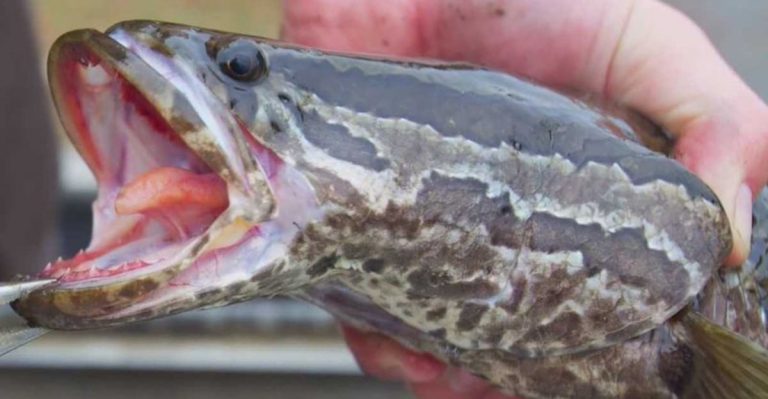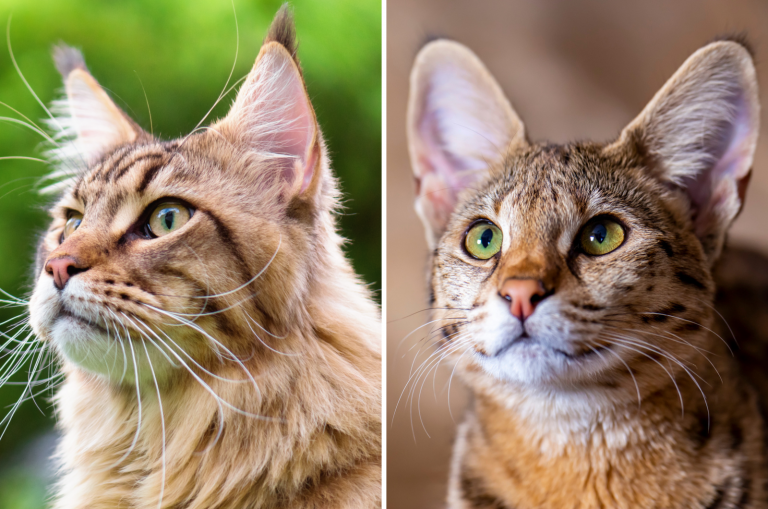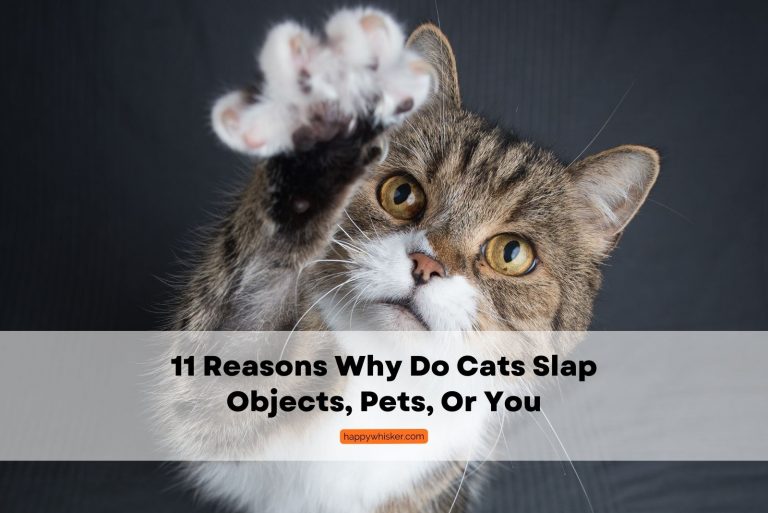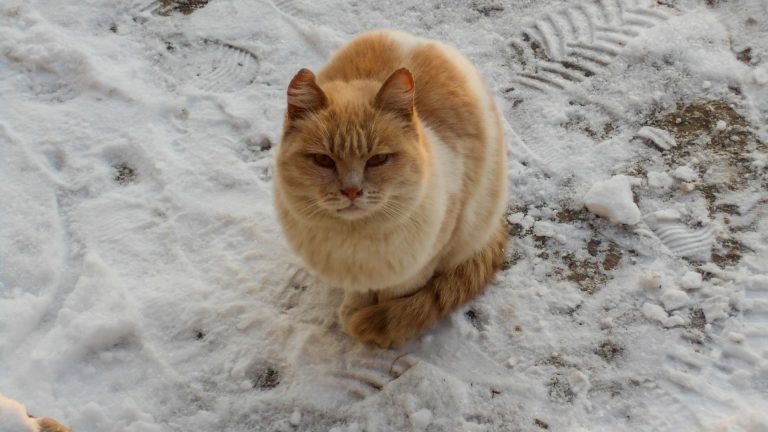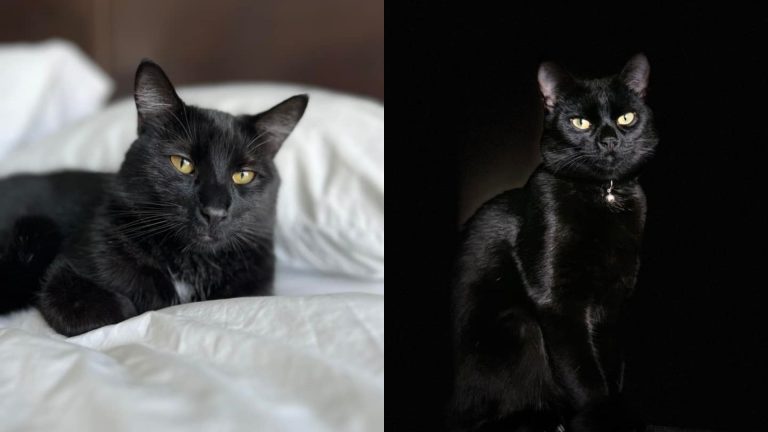Is Orange Cat Poop A Good Sign Or A Bad One?
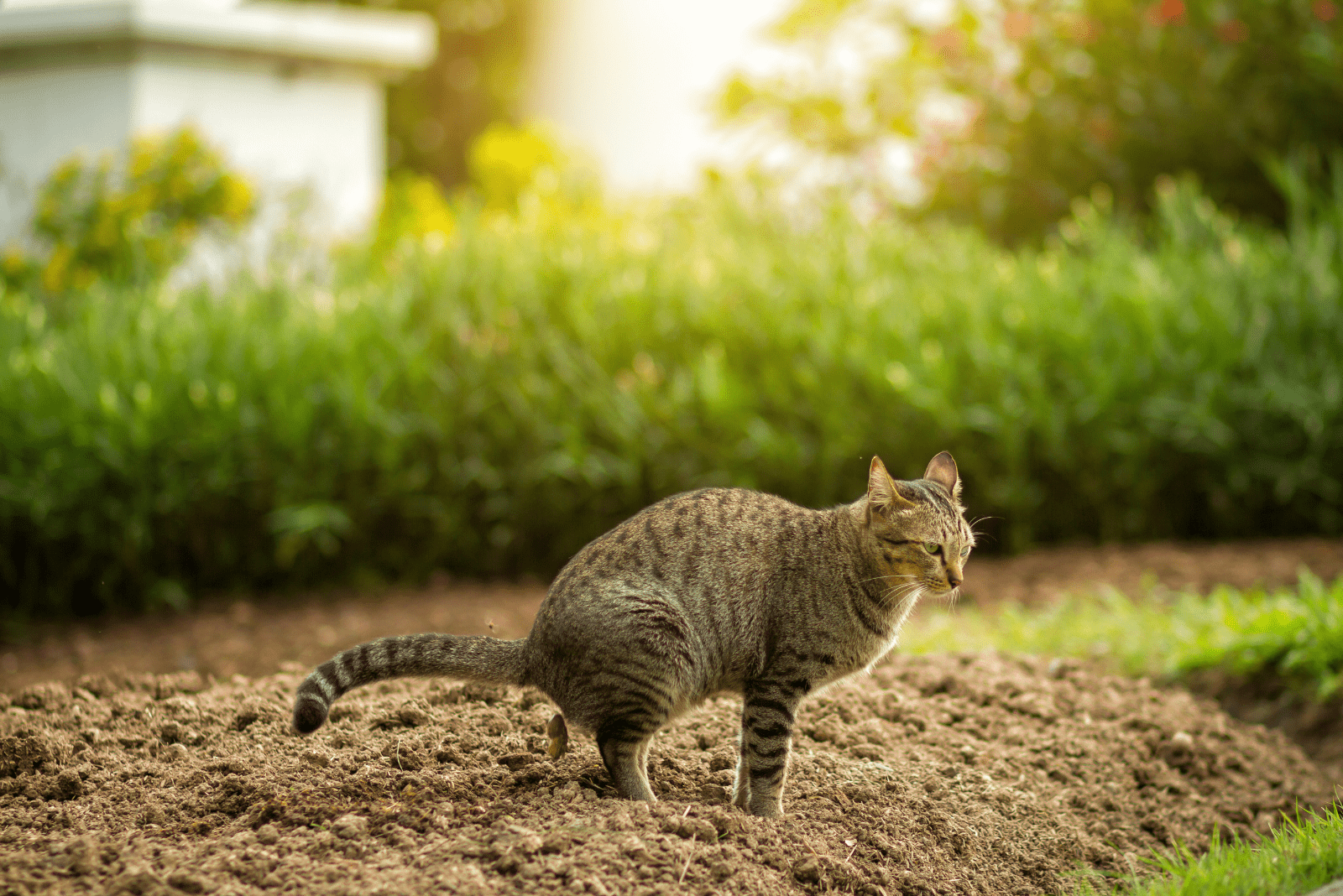
Most cat owners don’t pay close attention to the cat’s poop while cleaning the litter box. Even though it may be unpleasant, they should pay close attention to the cat’s poop because a lot can be told from its consistency and color.
A cat’s stool may help you realize when something’s wrong with your furry friend or if it’s sick.
Normally, a healthy cat’s stool looks smooth and it’s usually shaped like a sausage having a firm consistency. Moreover, if it appears in brown or dark brown color, it means that your feline has a healthy stool.
However, the cat’s may have different poop consistency and it may also appear in different colors such as red, black, green, yellow and orange.
If a cat’s poop isn’t in standard shape and color as previously described, that means that something’s wrong. However, these problems may vary from less to more serious.
So, if you noticed that your feline’s poop is orange, read on and find out the meaning behind the orange cat poop, what causes it, and how you should react!
The Meaning Of Orange Cat Poop Color
If you notice orange cat poop while cleaning the litter box, then you should pay close attention to your kitty and their overall health, as this is not completely normal. So, what does normal cat poop look like?
A normal, healthy cat’s stool should be shaped like a sausage, and it should be brown, light brown, or dark brown in color, otherwise, it’s not healthy. Moreover, the consistency should be firm like playdough, indicating a healthy bowel movement.
However, any other poop color or consistency indicates problems. These problems may vary from mild to more severe, and we will talk about that later on in the article.
What Causes An Orange Colored Cat’s Stool?
As far as orange cat poop color is concerned, it may happen simply due to food additives or certain types of food. If that’s the only problem, the cat’s stool usually goes back to normal after they digest the food properly.
If food intake is the main culprit for the orange color in the cat’s stool, it usually means that the food contains an orange pigment called beta carotene.
Carotenoids are similar to this pigment, but the main difference is that carotenoids may be many different colors as well as orange.
If your cat’s poop is orange due to colored food, you shouldn’t worry as it’s not usually serious. However, there are times when orange cat poop may indicate that there are other health problems.
These problems are usually followed by additional symptoms, such as vomiting, loss of appetite, fever, and similar. These symptoms require professional help and proper treatment.
Read on to find out what possible health issues can result in orange cat poop, and how to treat them.
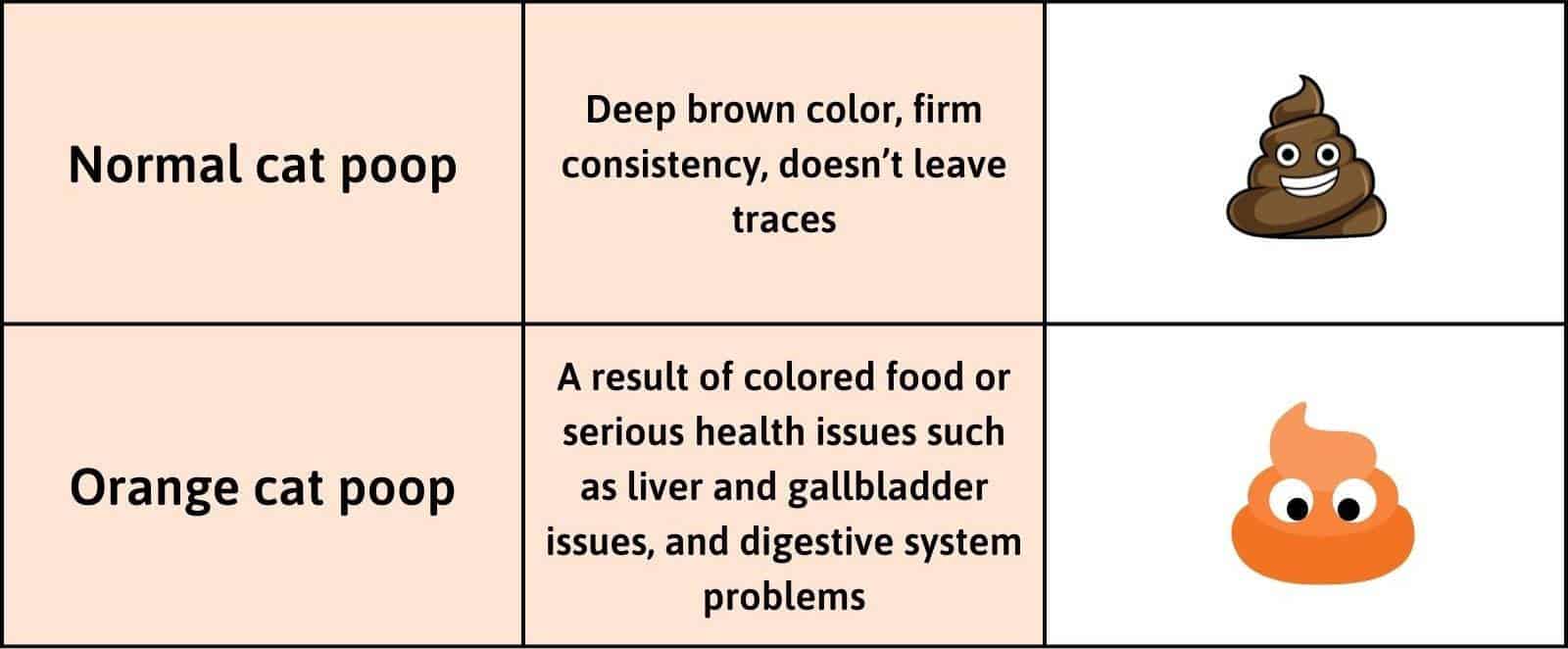
Possible Health Issues That Result In Orange Cat Poop
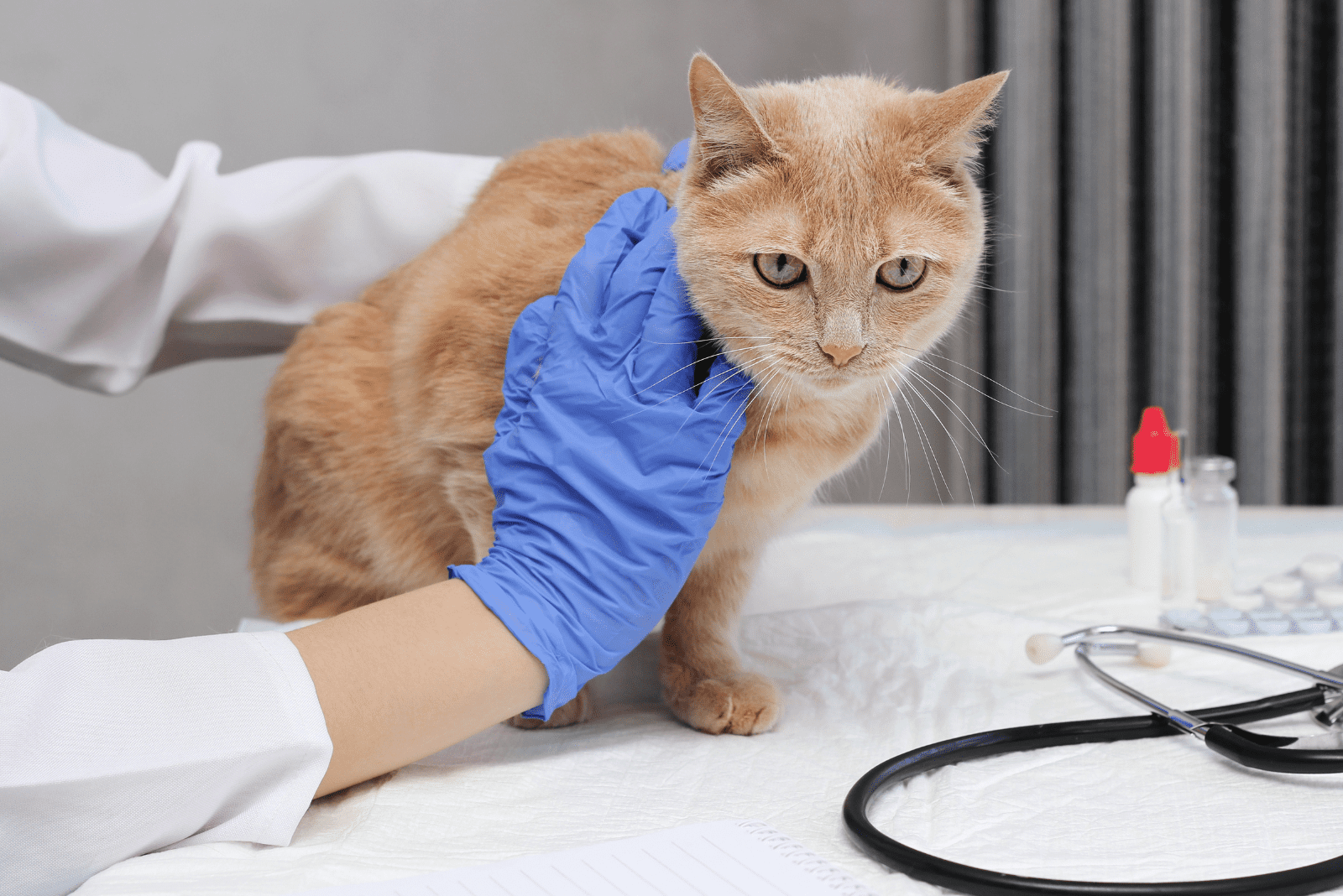
There are some more serious health issues that may result in orange cat poop. Check them out carefully so you know when you should take your furry friend for a check-up with the vet.
Health Issue No1 – Liver Problems
If you notice orange poop in your cat’s litter box, it may mean that the cat has liver problems. These liver problems usually occur due to issues with bile production.
The liver produces an acidic liquid that helps with digestion, called bile. If this bile functions normally, a cat will have a normal brown-colored stool.
However, if your feline friend has serious liver problems, it cannot produce enough bile, which is why the cat’s feces may be more orange in color.
In order to recognize liver problems, you should know that there are several other symptoms besides orange poop. These symptoms include lethargy and weakness, loss of appetite, weight loss, vomiting, excessive meowing and thirst, stomach ulceration, and frequent urination.
If you notice any of these symptoms, the best thing to do is to take your pet to the vet for an examination. The vet will run some tests such as blood tests, urinalysis, and x-rays, in order to discover the underlying cause of the symptoms.
If it appears that your cat suffers from liver disease, the vet will provide the proper treatment according to the type of liver problems the cat is experiencing. This treatment usually includes dietary changes, switching to a cat food with very low carbohydrate levels.
Health Issue No2 – Gallbladder Issues
Another health issue that can cause orange cat poop is gallbladder issues. Gallbladder issues cause other symptoms like loss of appetite, abdominal pain, vomiting, lethargy, and weakness. These can help you recognize the problem.
Gallbladder issues may be caused by bacterial infections that initially affect the intestines and then go on to affect either the cat’s bloodstream or the bile duct.
Aside from the less serious symptoms that may appear with this health problem, gallbladder issues can also be caused by abdominal trauma or even tumors, which require special veterinary care.
Therefore, if you notice some of these symptoms, make sure you take your cat to the vet so they can treat it properly once they have the right diagnosis.
These issues are usually treated with antibiotics, vitamin supplements, or other medications that will help your feline friend to recover as quickly as possible.
Health Issue No3 – Problems With The Digestive System
Problems with the digestive system is a very broad topic, however, many digestive problems can lead to orange cat poop, which is why it’s important that this is mentioned.
Digestive system issues, or gastrointestinal issues, may develop suddenly or gradually and they’re almost always accompanied with other symptoms such as behavior changes, loss of appetite, weight loss, diarrhea, vomiting, constipation, abdominal pain, inflammation, and similar.
Digestive problems may be caused by following conditions:
• Food allergies – many cats have digestive issues due to food sensitivities. They may have an intolerance to certain foods so they cannot digest it properly. In most cases, this situation ends with either vomiting or diarrhea which may be orange in color.
So, if you notice orange cat poop, the cause may be food allergies, and that’s a good reason to feed your cat with only the best quality cat food.
• Constipation – this is an irregular bowel movement in a cat. This means that the feline cannot defecate properly.
This condition is most common in overweight cats or in cats that suffer from other health conditions.
For constipation, the vet usually prescribes a special diet including more water intake and wet food because it’s higher in moisture. They may also recommend more activity time, dietary supplements, and similar.
• Hairballs – these can also lead to digestive issues. Hairballs are a normal thing in cats. While grooming, they ingest their hair which later forms into balls and have to be vomited back up.
However, frequent hairballs isn’t normal, and it may indicate certain digestive problems.
Usually cats defecate their hairs or throw them up. However, if you notice that your feline friend struggles to produce hairballs, take them to the vet to check for digestive problems.
• Stress – many health issues can be caused by stress, and in cats, stress can cause digestive problems, including orange poo.
If you suspect that your cat is experiencing symptoms of digestive distress as a result of being stressed, then you may want to consult with your vet. Try to find out what stresses your cat, and then try to reduce triggers for this stress.
• Intestinal blockages – this is when there is an obstruction of the digestive tract. This is an extremely serious condition which requires immediate professional help.
In order to recognize this problem, you should know that this condition also causes other symptoms such as vomiting, lethargy, weakness, and pain.. In most cases, treatment includes surgery, but most cats recover within a couple of days.
RECOMMENDED ARTICLE: Why Does My Cat’s Poop Smell So Bad? Causes And Solutions
Stool Consistency Is Also Important!
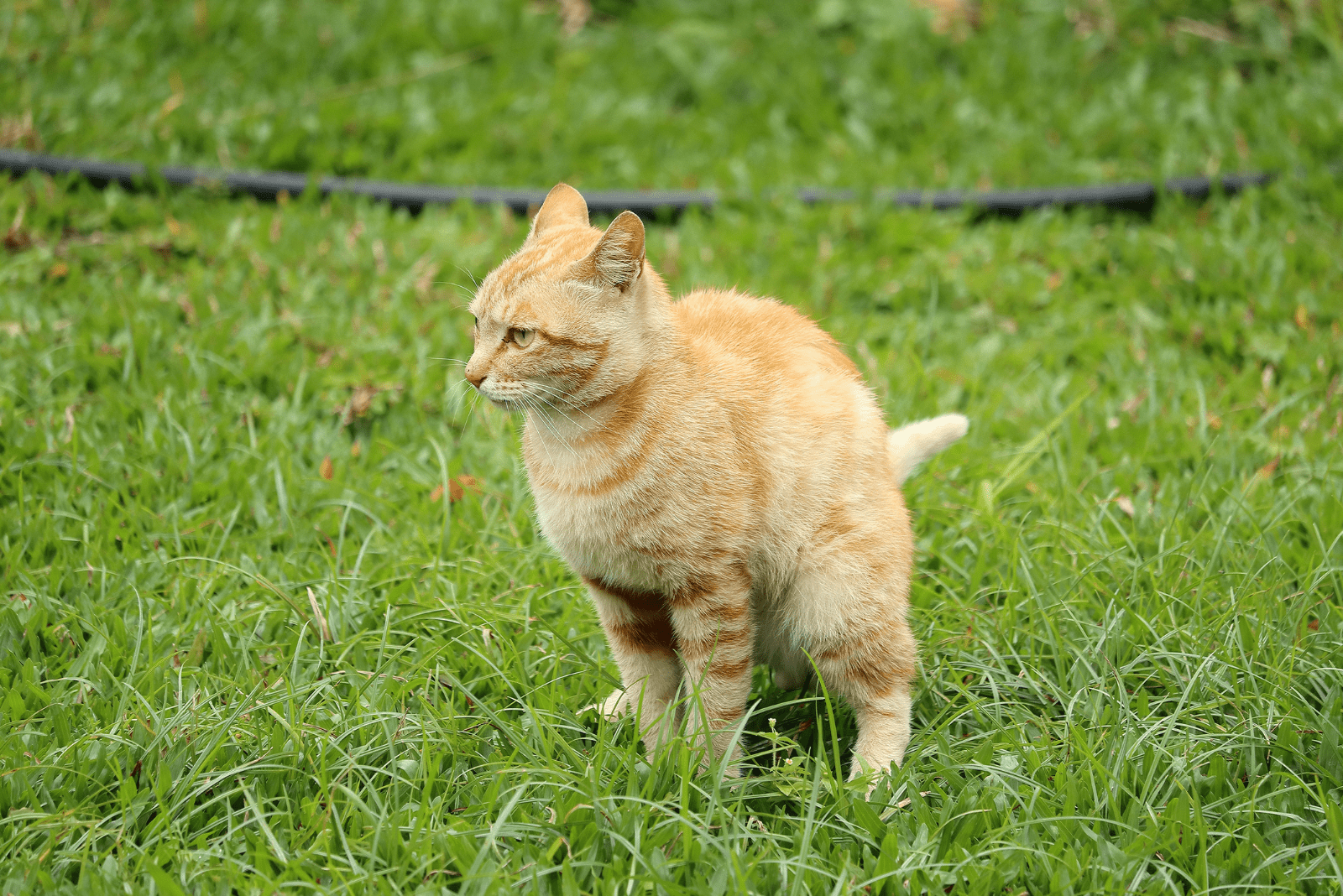
As well as cat poop color, stool consistency is also important if you want to know if your cat healthy or not:
• Firm stool – a normal cat’s stool should be firm, but not too hard. It should be easily picked up from the cat’s litter box, leaving no marks. Moreover, it shouldn’t contain blood or anything similar, and it should be brown in color.
• Half firm, half soft stool – if your cat’s stool is half firm, half soft, it may indicate that the cat has an upset stomach due to a new cat food, or other changes in cat’s diet.
This may also occur due to stress. These are temporary problems, and the cat’s stool should go back to normal very quickly. However, if it doesn’t go back to normal, or if other symptoms appear, then you should contact your veterinarian.
• Watery stools– if your cat’s stool is watery and light in color, this may indicate that your cat is suffering from diarrhea. There are a few possible reasons for cats leaking brown fluid, or diarrhea, including:
a) Inflammatory Bowel Disease (IBD) – cat diarrhea may be caused by IBD,which occurs when a cat has inflammation or irritation of the GI tract.
b) Bacterial infections – there are several bacterial infections that can cause cats to have diarrhea. This is usually accompanied by other symptoms such as fever, nausea, runny nose, watery eyes, loss of appetite, and lethargy.
c) Intestinal worms – these parasites are the most common reason for diarrhea in cats. The most frequent type of intestinal parasites are tapeworms and roundworms which affect the cat’s small intestine, leading to problems with the digestive tract including diarrhea.
Sometimes, worms can be visible in the cat’s feces which means that you should act immediately to deworm your feline friend.
d) Viruses – viruses, especially those which attack the intestines, may lead to diarrhea and other gastrointestinal issues in cats.
c) Food intolerances – not every food is healthy for cats, therefore it’s important to feed them with top-quality cat food Sometimes, cat owners give their kittens human food.
If you do that, you should be 100% sure that that food is suitable and healthy for them. If it’s not, it may lead to diarrhea and other digestive issues.
For example, although cats may like milk, they are actually lactose intolerant, and milk consumption may upset their stomach and lead to pain and diarrhea.
RECOMMENDED ARTICLE: Why Is My Cat Pooping On Floor Randomly? Reasons & Solutions
Should You Worry About The Orange Color Of Your Cat’s Poop?
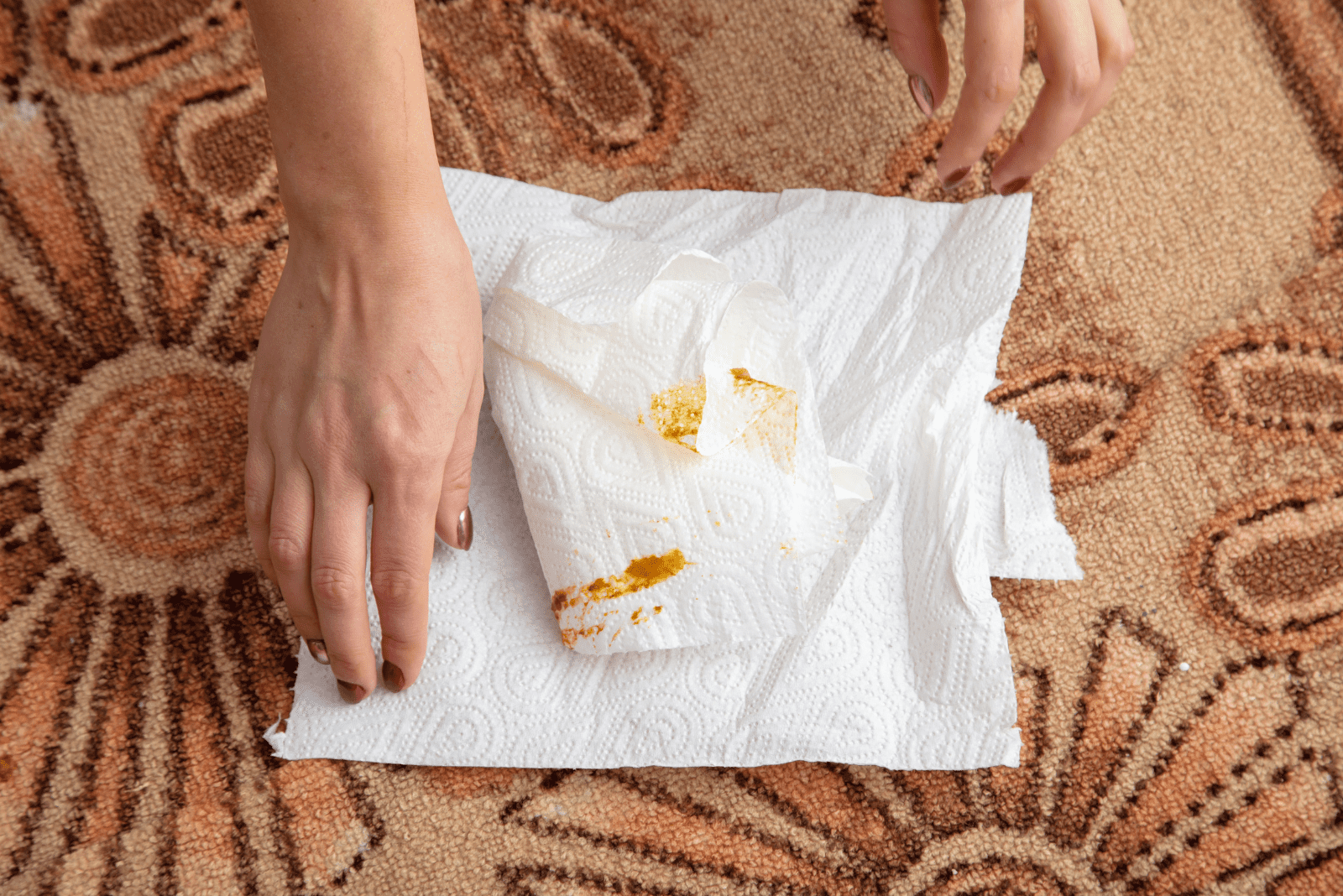
If you notice an orange cat poop in the litter box, then you should start to monitor your cat for any other symptoms of illness.
If the cat has orange cat poop only, without other symptoms, this usually doesn’t indicate anything serious and you shouldn’t worry as it’s probably due to something simple such as consuming food containing beta carotene.
However, if you notice that you feline has other symptoms besides orange poop (such as throwing up, fever, loss of appetite, abdominal pain, weight loss, constipation, etc.), then it is best to take your cat to the vet so that they can examine and provide them with the proper cat care.
These symptoms, alongside orange cat poop, may indicate some more serious health issues such as liver problems, digestive issues, or gallbladder problems, all of which require prompt diagnosis and treatment.
Your cat’s health should be monitored carefully during their recovery, but in most cases, cats usually get better very quickly with proper treatment.
Orange cat poop doesn’t necessarily indicate something serious, but it can. This is why it’s highly important to consult your vet for advice, just in case.
RECOMMENDED ARTICLE: How Long Can A Cat Go Without Using The Bathroom? Explained
Other Possible Stool Colors And Their Meanings
Orange cat poop is usually caused by food, but it may also occur as a result of more serious health issues that require special veterinary care.
However, as far as other poop colors are concerned, they may indicate conditions ranging from mild to extremely serious. Therefore, it’s important to check out the various cat poop meanings so that you can take action.
• Black cat poop color – if you notice that your feline friend has a black tarry stool, you should contact your vet right away.
Black poop color usually means a bleed in the cat’s gastrointestinal tract. This is usually accompanied by symptoms such as weight loss, vomiting, weakness, lethargy, loss of appetite, and similar.
After the vet examines the cat, they’ll conduct tests and then decide on a treatment plan. To give your feline the right treatment, it is important the vet investigates the cat’s health fully, so make sure you monitor your pet’s symptoms well.
• White cat poop color – if your kitty has white-colored poop, this may suggest that it suffers from certain health issues such as liver and kidney problems, intestinal parasites, bile duct issues, dietary changes, bacterial infections, etc.
If you notice white cat poop you should contact your veterinarian right away and take your feline for an examination so that it can be treated promptly for whatever is wrong.
• Green cat poop color – if a cat’s stool is green in color, it usually means that the cat has a parasitic or bacterial infection.
This usually happens if a cat consumes contaminated feces, meat, or even water. However, a green stool may also appear as a result of something as harmless as eating grass.
Regardless of that, it is best to take your kitty for a vet visit, so that they can make a diagnosis and establish a treatment plan if necessary.
• Red cat poop color – red poop is as alarming as a black poop color. This means the cat’s poop contains red blood which usually indicates bleeding from the anus or rectum.
Such bleeding may happen due to bacterial infections or infectious diseases such as Feline Panleukopenia.
If the bleeding doesn’t stop, the cat has other symptoms, or you are worried, take your cat to the vet so that it can receive professional help.
• Yellow cat poop color – it’s also possible for a cat’s stool may be yellow in color. This may indicate liver problems.
However, in most cases it isn’t anything serious. Of course, yellow poop color may seem a bit weird, so you might want to consult with your veterinarian just in case there is an underlying health issue.
FAQ
How Long Can Cats Hold Their Poop?
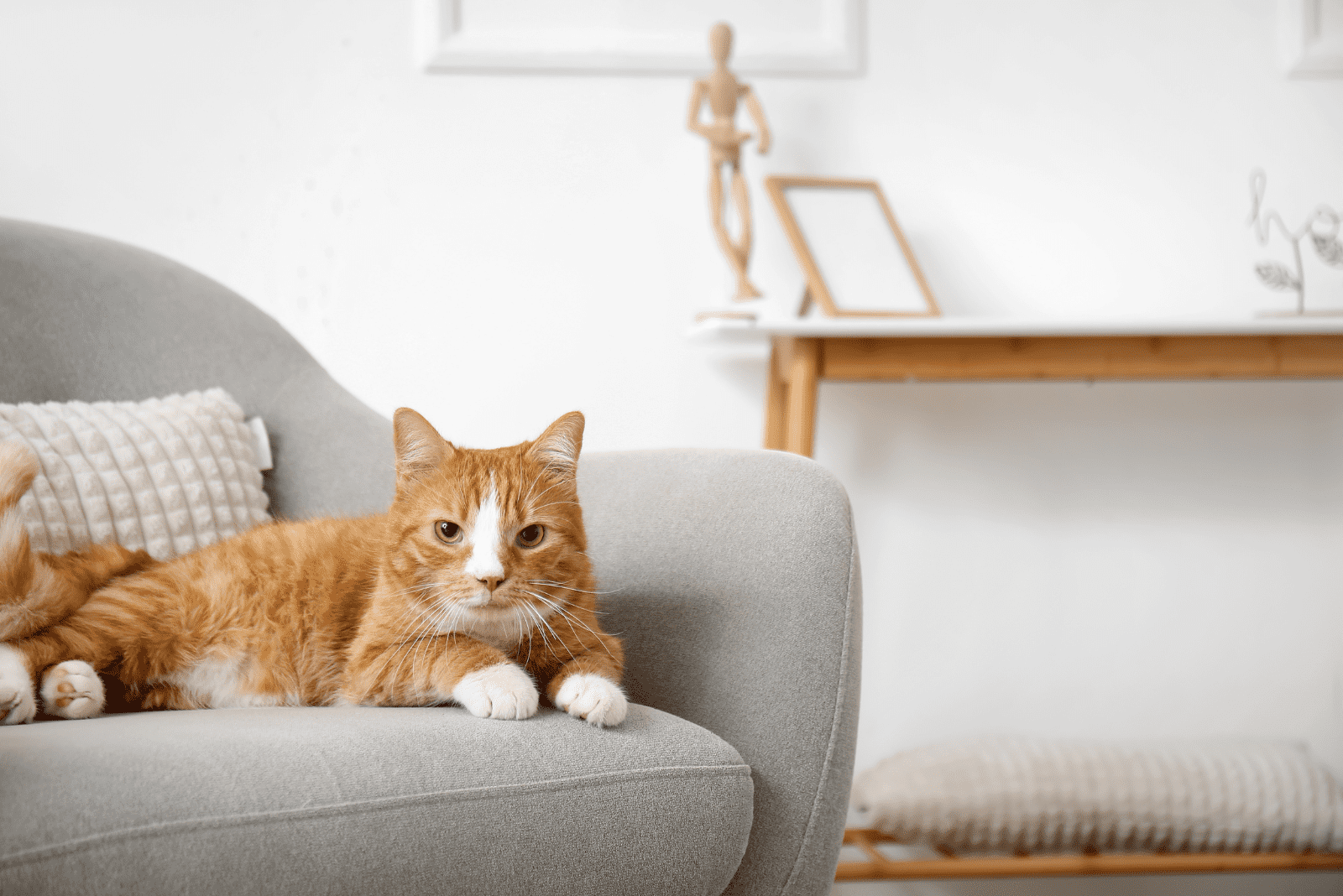
A healthy cat should poop once or twice a day. However, most of them can hold their poop for 24/48 hours just as they can hold their pee.
This is not the same for all cats and we cannot really control them; they usually pee or poop when they feel like it, and it’s not actually healthy for them to hold on too long.
When it comes to kittens, they can hold their poop for around 12 to 24 hours, but again, it depends on the individual cat.
Does Orange Cat Poop Indicate A Lack Of Bile In Cats?
It’s true that orange cat poop may indicate a lack of bile in cats. A cat’s liver produces an acidic liquid called bile that helps cats during digestion.
However, if a cat suffers from certain liver problems or diarrhea, the liver cannot produce enough bile, which can eventually result in orange cat poop.
How To Diagnose The Cause of Orange Cat Poop?
In order to receive a proper diagnosis and establish a treatment plan for your furry friend, the best thing to do is to visit your vet, or at least consult with them.
Orange cat poop can point to both minor and serious issues. The cause of orange poop may be as simple as orange food, or a result of a more serious health problem such as digestive issues, liver problems, gallbladder problems, and similar.
These serious health problems usually present with other symptoms as well, and if you notice them, you should visit the vet. The vet will run some tests in order to get the right diagnosis and find the right treatment.
What If My Cat’s Poop Is Black Or Red?
If your cat’s poop is black or red in color, you need to take your cat to the vet immediately.
These two colors are very alarming and require special care, as the main cause for these colors of the feces may be bleeding from the rectum or anus, inflammation of the intestine, serious infection, parasites, anal gland problems, and other conditions.
How Many Times A Day Should A Healthy Cat Poop?
A healthy cat should poop once or twice a day. If your feline friend poops more than two or three times a day, or doesn’t poop at all for a few days, then it may be a good idea to consult with your vet, as your cat may have some health problems which require attention.
Wrapping It Up!
It’s easy to notice when your cat has diarrhea, but have you ever paid close attention to the color of your cat’s poop? Although it may sound ridiculous, it can actually be really helpful in determining whether your feline friend is healthy or not.
In case you never noticed, cat’s poop may have different consistencies and may also appear in different colors. Each consistency and poop color may indicate certain health issues.
As we have seen, a cat’s poop may appear orange in color. Orange cat poop doesn’t necessarily indicate serious health issues; It can occur due to orange food, which contains beta carotene.
However, the appearance of other symptoms, along with orange poop, such as vomiting, constipation, loss of appetite, weight loss, fever, etc. means that the feline is suffering from a more serious health issue.
Possible conditions include gallbladder problems, digestive system issues, and liver problems. If you notice these in your furry friend, it’s important to take it to the vet for a thorough examination and treatment based on the vet’s diagnosis.
Cats usually recover very quickly, so there’s no need to worry about your feline friend, just make sure that they receive the best cat care!
Like this post? Share or pin it for later!
